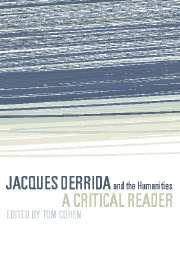Book contents
- Frontmatter
- Contents
- Preface
- Acknowledgements
- Biographical chronology
- Introduction: Derrida and the future of …
- Chapter 1 The future of the profession or the university without condition (thanks to the “Humanities,” what could take place tomorrow)
- Chapter 2 Derrida and literature
- Chapter 3 Derrida and gender: the other sexual difference
- Chapter 4 Derrida and aesthetics: Lemming (reframing the abyss)
- Chapter 5 Derrida and representation: mimesis, presentation, and representation
- Chapter 6 Derrida and philosophy: acts of engagement
- Chapter 7 Derrida and ethics: hospitable thought
- Chapter 8 Derrida and politics
- Chapter 9 Derrida and law: legitimate fictions
- Chapter 10 Derrida and technology: fidelity at the limits of deconstruction and the prosthesis of faith
- Chapter 11 Derrida and history: some questions Derrida pursues in his early writings
- Chapter 12 Derrida and psychoanalysis: desistantial psychoanalysis
- Glossary
- Index
Chapter 1 - The future of the profession or the university without condition (thanks to the “Humanities,” what could take place tomorrow)
Published online by Cambridge University Press: 22 September 2009
- Frontmatter
- Contents
- Preface
- Acknowledgements
- Biographical chronology
- Introduction: Derrida and the future of …
- Chapter 1 The future of the profession or the university without condition (thanks to the “Humanities,” what could take place tomorrow)
- Chapter 2 Derrida and literature
- Chapter 3 Derrida and gender: the other sexual difference
- Chapter 4 Derrida and aesthetics: Lemming (reframing the abyss)
- Chapter 5 Derrida and representation: mimesis, presentation, and representation
- Chapter 6 Derrida and philosophy: acts of engagement
- Chapter 7 Derrida and ethics: hospitable thought
- Chapter 8 Derrida and politics
- Chapter 9 Derrida and law: legitimate fictions
- Chapter 10 Derrida and technology: fidelity at the limits of deconstruction and the prosthesis of faith
- Chapter 11 Derrida and history: some questions Derrida pursues in his early writings
- Chapter 12 Derrida and psychoanalysis: desistantial psychoanalysis
- Glossary
- Index
Summary
This will no doubt be like a profession of faith: the profession of faith of a professor who would act as if he were nevertheless asking your permission to be unfaithful or a traitor to his habitual practice.
Before I even begin to follow in fact a torturous itinerary, here is the thesis, in direct and broadly simple terms, that I am submitting to you for discussion. It will be distributed among a series of propositions. In truth, it will be less a thesis, or even an hypothesis, than a declarative engagement, an appeal in the form of a profession of faith: faith in the University and, within the University, faith in the Humanities of tomorrow.
The long title proposed for this chapter signifies first that the modern university should be without condition. By “modern university,” let us understand the one whose European model, after a rich and complex medieval history, has become prevalent, which is to say “classic,” over the last two centuries in states of a democratic type. This university claims and ought to be granted in principle, besides what is called academic freedom, an unconditional freedom to question and to assert, or even, going still further, the right to say publicly all that is required by research, knowledge, and thought concerning the truth. However enigmatic it may be, the reference to truth remains fundamental enough to be found, along with light (lux), on the symbolic insignias of more than one university.
- Type
- Chapter
- Information
- Jacques Derrida and the HumanitiesA Critical Reader, pp. 24 - 57Publisher: Cambridge University PressPrint publication year: 2002
- 16
- Cited by



